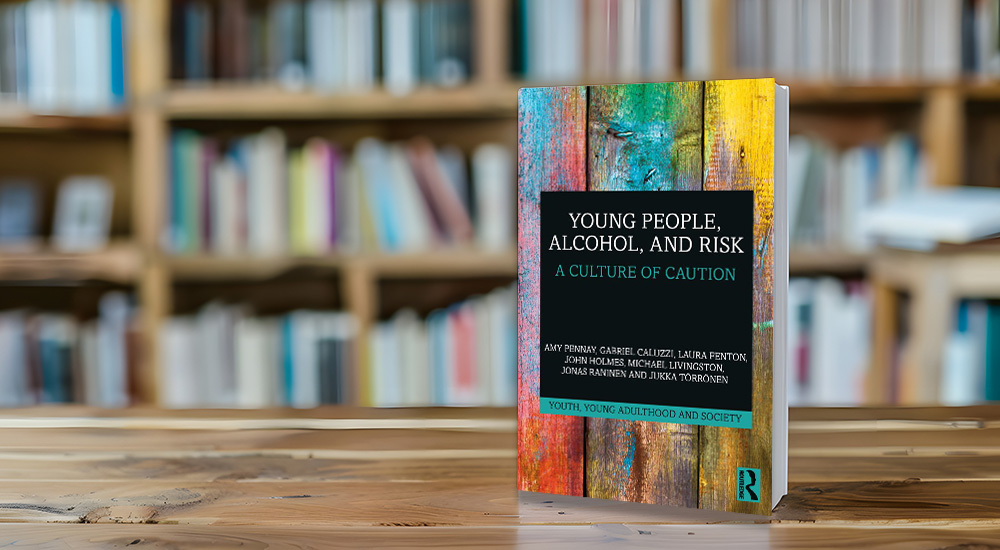SARG researchers co-author new book exploring 'culture of caution' in youth drinking decline

A new book by an international team of experts, including researchers from the Sheffield Addictions Research Group (SARG), unpacks the complex social, cultural and economic factors driving the decline in young people's alcohol consumption.
'Young People, Alcohol, and Risk: A Culture of Caution' is co-authored by SARG Director Professor John Holmes and Research Associate Dr Laura Fenton, and was published in April 2025 by Routledge. The book offers a comprehensive look at the reasons behind the significant decline in youth drinking observed in high-income countries since the early 2000s.
The book explores various factors that have reshaped the social and cultural position of alcohol for young people. It highlights the importance of shifts in attitudes towards alcohol, evolving family and parenting practices, the role of digital technology and changes in leisure, the influence of economic pressures, an increased focus on individual responsibility, growing health consciousness, and evolving gender norms. However it does not view any of these factors as a main cause of the decline in drinking.
Instead, the book looks beyond alcohol to identify a wider culture of caution in young people, evident in declines across other risky behaviours. The authors propose that today's youth represent a distinct, more cautious generation, shaped by broader societal conditions.
Insights from the Institute of Alcohol Studies
In a blog post written for the Institute of Alcohol Studies (IAS), the authors elaborate that rates of risky drinking among teenagers in countries like Australia, Sweden and the UK have more than halved since the early 2000s, making not drinking alcohol a majority behaviour for many young people.
The blog post explains that this trend is unique to younger age groups, contrasting with stable or increasing rates in older populations. It also clarifies that while digital technologies are important, their impact on alcohol use is best understood through their interaction with the other social and cultural factors discussed in the book.
You can also hear more about the book's findings in a new IAS podcast episode, 'Why are young people drinking less?'. Professor John Holmes and Dr Amy Pennay of La Trobe University discuss the book, the continued decline in drinking into adulthood, and why this trend is a broader sociological issue of generational change. As Professor Holmes states, "This particular generation, that often gets called Gen Z, have a very particular perspective on the world that is quite different to those that have come before them."
Research at the University of Sheffield
For their contributions to the book, Professor Holmes and Dr Fenton drew upon the extensive research undertaken as part of the University of Sheffield's Youth Drinking in Decline project (2018-2023). Funded by Wellcome, this project used a mixed-methods approach to investigate the nature of and reasons for reductions in alcohol use among young people in England.
Implications for public health
While the decline in youth drinking has positive public health implications, the book also encourages consideration of young people's overall wellbeing, noting that these declines are occurring simultaneously with increasing mental health problems in high-income countries. The relationship between this generation's more cautious approach to risk and their wider wellbeing needs further exploration.
Young People, Alcohol, and Risk: A Culture of Caution by Amy Pennay, Gabriel Caluzzi, Laura Fenton, John Holmes, Michael Livingston, Jonas Raninen and Jukka Törrönen is available to buy from Routledge.
-
SARG researchers to showcase local health modelling at the Prevention Research Conference 2026
Researchers from the Sheffield Addictions Research Group (SARG) will present work from the Local Health and Global Profits programme at the Prevention Research Conference 2026 in Birmingham on 4-5 March.
-
New research shows that spending less on tobacco, gambling and sweets is good for the UK economy
A new study from the Sheffield Addictions Research Group (SARG) has found that public health policies which reduce spending on harmful products can actually provide a significant boost to UK jobs and the wider economy.
-
SARG researcher Dr Parvati Perman-Howe secures NIHR Career Development Award
We are delighted to announce that Dr Parvati Perman-Howe, a Research Associate within the Sheffield Addictions Research Group (SARG), has secured a highly sought-after Career Development Award.
-
Professor John Holmes contributes to major new report outlining actions to tackle alcohol harm
SARG Director Professor John Holmes was part of an expert panel that supported the development of 'A Healthier Future: A long-term vision to tackle alcohol harm in the UK', a significant new report published by the Institute of Alcohol Studies (IAS) this week.
You might also be interested in…
-
Young people's consumption of no/low alcohol drinks in family settings
This project explores young people's consumption of no/low alcohol drinks in Great Britain, focusing on family settings. Using surveys and interviews, it will investigate adult perceptions, consumption trends, and the relationship between no/low and alcohol use among young people.
-
SARG researchers share insights into youth and student drinking at national conference
Researchers from the Sheffield Addictions Research Group (SARG) recently presented their findings on youth and student drinking trends at the Student Health Association Annual Conference, held from Sunday 29 June to Tuesday 1 July 2025 in Sheffield.
-
Youth Drinking in Decline
The Youth Drinking In Decline (Y-DID) project aimed to provide the most detailed analysis to date of the nature and drivers of recent reductions in alcohol use among 11-24 year-olds in England.
